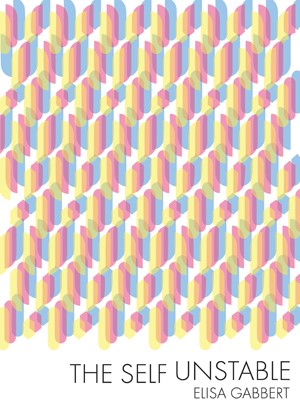96 pages, $14.95
Review by Jacob Spears
In a world turning increasingly to the virtual, the brief prose poems in Elisa Gabbert’s The Self Unstable read like postcards or dispatches from a new frontier in which the map is just as much a part of reality as the territory. It is a change in form from her debut collection of verse poetry, The French Exit, and because most of the pieces in The Self Unstable are longer than a tweet, at first glance their brevity calls to mind status updates, social media, and the world of our virtual selves. The connotation seems intentional, as many of Gabbert’s entries in the book come up against conversations that social media encourages only the self-obsessed and that what is disguised as insight in a post is so often banal. By weaving witty aphorisms, poetic images, and personal reflections into each entry, Gabbert charts out new territories for conceiving of the self and our relationships to the world, both real and virtual.
Each one embarks on a line of thought, for instance, child rearing: “If you suspect your child is a genius, observe it carefully.” After pointing out high curiosity levels and a sense of humor as baby genius indicators, Gabbert’s satirical joke reaches its punch line: “Always keep a control child nearby for comparison.” But the narrator moves away from the joke and follows the contours of that line of thought. “I strongly suspect that I was a control child. My brother convinced me I wanted to be a boy. Or, because of my brother, I wanted to be a boy.” By the end we find ourselves in a new and unfamiliar place we did not expect to be taken, pondering questions of identity. As a result, new ways of thinking emerge in The Self Unstable that are surprising, yet they resonant with sense of familiarity.
The Self Unstable is a descendant of Pessoa’s The Book of Disquiet. Like the Lisbon poet’s musings on the self and its multiple variations, Gabbert’s pieces emulate his form and share some of his obsessions. Unlike Pessoa’s great unease about how unsettled his self is, Gabbert approaches the subject with levity; the antimonies of being are no longer unbearable, but elastic and enjoyable. A seemingly relativistic statement—“According to quantum theory, there’s a real possibility you could fall through the floor.”—can open a passage, but it works through the statistical likelihood of boring words to the possibility of “radically editing” the world, finding a humorous resolve—“If you like karaoke, you’ll love neo-benshi.” Once the self is unbound, Gabbert is free to explore the new zones of the psyche without fear. The Self Unstable is not a book that seeks to answer the deeper questions of existence, but to play with them, to stretch out meaning into new territories.
While they are often philosophical, the entries seem to resist demanding the reader to make a judgment of their truth claims based on lived reality. For instance, one could easily muse about the accuracy of a statement such as, “In a moment of silence thoughts may impose themselves on the silence.” But the point is not to languish in that limbo of wondering if what is written on the page faithfully coheres to reality. The essay continues, “So it becomes necessary to avoid silence. Wear headphones on the train. The problem with the train is the beautiful girls who never notice me. I am only noticed by less beautiful girls.” And it takes another turn from there. Who is making these connections? It is hard to parse out because the narrator is free to constantly change as she (or he) moves further along, unburdened by a stable sense of self.
While some of the entries in The Self Unstable follow a similar rhythm, they are not formulaic and there is always an element of surprise that makes this short collection of prose poetry provocative and hilarious. As we all spend increasingly more time in the virtual world, new spaces of our psyches develop that need exploring and mapping. It is exciting to see Gabbert bring philosophical musings into the conversation to show that not everything that looks at the self is self-obsessed. She is also unafraid to reveal the opposite: sometimes it is philosophy that is mundane and it is banal observations of the everyday that are insightful. Her ability to navigate the virtual, in both high and low registers, beckons us to the opening frontiers of our psyches, revealing the possibilities of a world at the hinterlands of our stable selves.
***
Jacob Spears is a writer from Pittsburgh whose fiction has appeared in Wilderness House Literary Review. He received his MFA from the University of Pittsburgh.
![[PANK]](http://pankmagazine.com/wp-content/themes/pank/assets/images/pank-logo-large.png)

